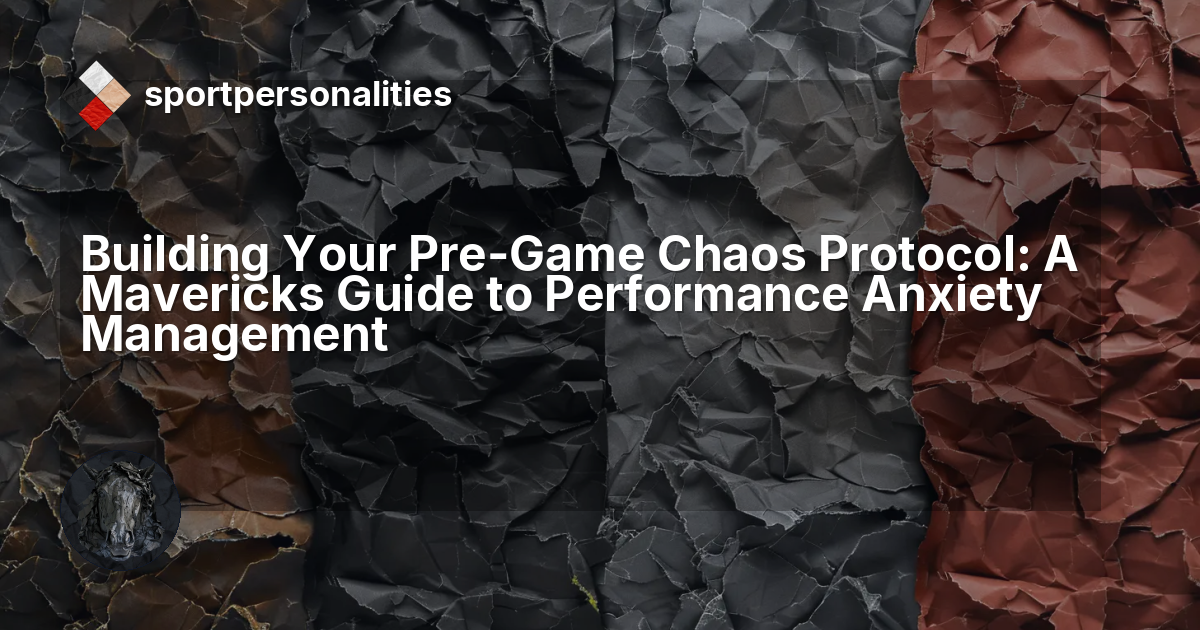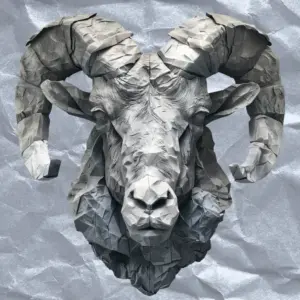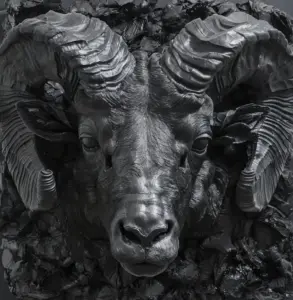Most athletes get nervous before competition. They overthink, second-guess, and replay mistakes. But if you're  The Maverick (IORA)? Your anxiety looks completely different. It's not doubt or fear of failure. It's the tension between needing complete autonomy and facing the structured demands of competition. Here's what this actually looks like: you get restless, you resist routine, and when someone tries to 'manage' your preparation, you feel like the walls are closing in.
The Maverick (IORA)? Your anxiety looks completely different. It's not doubt or fear of failure. It's the tension between needing complete autonomy and facing the structured demands of competition. Here's what this actually looks like: you get restless, you resist routine, and when someone tries to 'manage' your preparation, you feel like the walls are closing in.
The Maverick personality type demonstrates characteristics consistent with the IORA framework: internally motivated, opponent-focused, reactive, and solitary. When anxiety strikes before competition, it disrupts the very qualities that make you dangerous. Your instincts get clouded. Your spontaneity feels forced. The freedom you rely on suddenly feels like vulnerability.
This guide addresses performance anxiety specifically for athletes who show Maverick tendencies. If you've ever felt like traditional pre-game routines make your anxiety worse rather than better, you're in the right place.
Discover Your Sport Personality
This article explores one of 16 profiles. Find out which one you are and unlock a personalized blueprint for your athletic journey.
Take the Free TestWhy Traditional Anxiety Management Fails You
Most performance anxiety protocols assume athletes want structure, predictability, and external reassurance. Sports psychologists typically recommend detailed pre-game routines, breathing exercises on a fixed schedule, and visualization scripts that feel more like memorization than preparation.
For you, this approach backfires. Research in sport psychology indicates that anxiety management strategies must align with an athlete's natural cognitive approach and motivational style. When you force a reactive, autonomous competitor into rigid mental routines, you're adding pressure rather than relieving it.
If you're a Maverick, traditional anxiety management fails for three specific reasons:
- Structure feels suffocating when anxiety is already making you feel trapped
- External guidance triggers resistance at exactly the moment you need to trust yourself
- Planned responses conflict with reactive instincts, creating mental interference rather than clarity
You don't need to throw out anxiety management completely. You need a protocol that fits how you're actually wired.
What Maverick Performance Anxiety Actually Looks Like
Your anxiety doesn't present as visible nervousness. Observers might mistake it for arrogance or aloofness. Internally, though, you're experiencing a specific pattern of pre-competition tension.
The anxiety stems from a core psychological conflict. You're driven by intrinsic motivation and the desire to prove yourself against opponents on your own terms. Competition day brings external demands: team expectations, scheduled start times, mandatory warm-up protocols, and coaches wanting to "check in" about the game plan.
Each of these demands chips away at the sense of autonomy that fuels your performance. The anxiety isn't about whether you can win. It's about whether you'll be allowed to win your way.
You've probably done this: pulled away from teammates during warm-up, snapped at your coach's advice even though they meant well, completely ditched your usual routine, or obsessively changed everything. Where a Rival doubles down on planning or a Sparkplug finds their teammates, you do the opposite. You assert your independence, sometimes in ways that actually hurt your preparation.
Building Controlled Chaos: Your Flexible Framework
Forget routines. What works for you is controlled flexibility; basically, putting guardrails around your chaos instead of trying to kill it.
Start by identifying your non-negotiables. These are the 2-3 elements of preparation that genuinely help your performance, stripped of everything else. For a wrestler with Maverick traits, this might be: (1) 15 minutes of physical warm-up alone, (2) one specific song before stepping on the mat, (3) arriving at the venue early enough to explore the space independently.
See what's NOT on that list? No forced visualization. No mandatory pep talks. No 'you must do this at exactly 2:37pm' stuff. Just the essential elements that create readiness without creating restriction.
The protocol works by giving you a defined space for autonomy. You're not following someone else's anxiety management plan. You're protecting the conditions that allow your instincts to emerge.
The Three-Zone Approach to Pre-Game Anxiety
Divide your pre-competition time into three psychological zones, each with different rules about structure and spontaneity.
- The Autonomous Zone happens earliest, typically 2-4 hours before competition. This time is completely yours. No teammates, no coaches, no structured activities or rituals unless you choose them. Some Mavericks use this time for intense physical activity that has nothing to do with their sport. Others sit in complete stillness. The only rule: this zone belongs to you alone.
- The Transition Zone covers the final hour before competition. This is where your non-negotiables happen. You complete your 2-3 essential preparation elements, but in whatever order feels right that day. The structure exists, but the execution stays flexible. If your body is telling you to warm up differently than usual, you listen.
- The Competition Zone begins when you enter the field of play. Anxiety management ends here. You've done the work of creating conditions for your instincts to operate. Now you trust them completely. Athletes with Maverick characteristics perform best when they stop managing and start reacting.
This three-zone approach addresses the core psychological need: autonomy paired with just enough structure to prevent chaos from becoming counterproductive.
Practical Tactics for Maverick Anxiety Management
These specific techniques align with your reactive, opponent-focused nature. They're designed for implementation without feeling like you're following a script.
- Physical release before mental focus. Your anxiety often shows up as restless energy that traditional breathing exercises can't touch. Instead of trying to calm down, burn through the anxiety physically. Short, intense bursts of movement; sprints, burpees, heavy bag work. This lets you discharge nervous energy without depleting competition reserves. It works because it respects your reactive nature rather than fighting it.
- Opponent visualization, not outcome visualization. Standard visualization protocols ask athletes to imagine perfect execution and successful outcomes. For you, this creates pressure and feels disconnected from reality. Instead, visualize your opponent's tendencies, their patterns, the specific challenges they'll present. This type of mental rehearsal activates your competitive focus without triggering anxiety about your own performance.
- Environmental control through space claiming. Your anxiety often intensifies when you feel crowded or managed by others. Before competition, physically claim space that's yours. This might mean finding a corner of the locker room, walking the perimeter of the field alone, or arriving early enough to be in the venue before it fills with people. The physical act of establishing territory helps establish psychological boundaries.
- Permission to abandon the plan. Give yourself explicit permission to change your preparation if it's not working. This sounds counterintuitive for anxiety management, but for you, knowing you can adapt reduces the anxiety that comes from feeling locked into a failing approach. The security comes from trusting your judgment, not from following a predetermined path.
When Anxiety Signals Deeper Issues
Look, sometimes your pre-game anxiety is signaling something bigger that no protocol can fix. If your anxiety is consistently severe, interferes with basic preparation, or creates physical symptoms that affect your health, these are signs to seek help from a sports psychologist who understands athletic performance.
Your independence can become a liability when it prevents you from accessing support you genuinely need. Anxiety that makes you unable to compete, that triggers panic responses, or that extends beyond competition into daily life requires professional intervention.
This protocol handles normal competitive nerves. If you're having panic attacks or can't function, you need a sports psychologist, not an article.
Your Maverick Advantage in High-Pressure Moments
Athletes who display Maverick characteristics often perform better under pressure than in practice, provided their anxiety hasn't disrupted their preparation. The opponent-focused, reactive nature of your cognitive approach means you're built for the chaos of competition.
Your anxiety management protocol isn't about eliminating all nervous energy. It's about preventing pre-game anxiety from sabotaging the very qualities that make you effective when competition starts. The restlessness, the edge, the slight aggression that comes with competitive anxiety; these become assets once you're engaged with an actual opponent.
You don't need to be calm before competition. You need to be ready. There's a difference.
While athletes like  The Harmonizer (ISRC) might seek internal peace before competing, or
The Harmonizer (ISRC) might seek internal peace before competing, or  The Captain (EOTC) might channel energy into rallying teammates, your path is solitary and intense. The chaos protocol honors that path while preventing it from becoming destructive.
The Captain (EOTC) might channel energy into rallying teammates, your path is solitary and intense. The chaos protocol honors that path while preventing it from becoming destructive.
Build your framework with these principles. Test it in lower-stakes competitions. Adjust what doesn't serve your preparation. The protocol exists to protect your autonomy, not to replace it with another set of rules that feel foreign to who you are.
This content is for educational purposes, drawing on sport psychology research and professional experience. I hold an M.A. in Social Psychology, an ISSA Elite Trainer and Nutrition certification, and completed professional training in Sport Psychology for Athlete Development through the Barcelona Innovation Hub. I am not a licensed clinical psychologist or medical doctor. Individual results may vary. For clinical or medical concerns, please consult a licensed healthcare professional.




